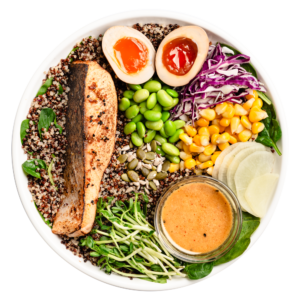Autoimmune conditions, where the immune system mistakenly attacks healthy cells, affect millions worldwide. Conditions like rheumatoid arthritis, lupus, and Hashimoto’s thyroiditis can significantly impact daily life. While conventional medicine often focuses on symptom management, functional nutrition for autoimmune conditions takes a holistic approach. It addresses the root causes of these conditions, promoting overall health and well-being.
Understanding Autoimmune Conditions
Autoimmune diseases occur when the immune system mistakenly targets the body’s own tissues, causing inflammation and damage. Contributing factors include genetic predispositions, environmental triggers, and lifestyle influences, all of which play roles in disease onset and progression. According to research published in Frontiers in Immunology, diet significantly impacts symptom management and quality of life, potentially influencing inflammation and immune function in autoimmune patients.
The Role of Nutrition
Nutrition is vital for everyone, but it holds particular significance for individuals with autoimmune conditions. Certain foods can either exacerbate or alleviate symptoms. A well-balanced, nutrient-dense diet can support immune function, reduce inflammation, and promote healing.
Functional nutrition emphasizes whole, unprocessed foods. This approach prioritizes nutrient density, meaning foods that provide a high amount of nutrients relative to their calorie content. These foods support the body’s healing processes and overall health.
Key Principles of Functional Nutrition
- Personalization: Every individual is unique, and their nutritional needs vary. Functional nutrition tailors dietary recommendations based on personal health history, genetics, and specific autoimmune conditions. This customization ensures that dietary changes are effective and sustainable.
- Anti-inflammatory Foods: Chronic inflammation is a hallmark of autoimmune diseases. Incorporating anti-inflammatory foods can help reduce this inflammation. Foods rich in omega-3 fatty acids, like fatty fish (salmon, mackerel, sardines) and flaxseeds, are beneficial. They help balance inflammatory responses in the body.
- Nutrient Density: Focus on foods high in vitamins, minerals, and antioxidants. Leafy greens, colorful fruits, nuts, seeds, and whole grains provide essential nutrients that support immune health. These foods nourish the body, enhance energy levels, and improve overall well-being.
- Elimination and Reintroduction: Identifying food sensitivities can be crucial for those with autoimmune conditions. A common approach involves eliminating potential trigger foods, such as gluten, dairy, and processed sugars, for a period. After this phase, reintroducing these foods one at a time can help pinpoint specific sensitivities.
- Hydration: Proper hydration is essential for all bodily functions, especially for those managing autoimmune diseases. Drinking adequate water helps maintain bodily functions, including digestion and nutrient absorption. Herbal teas and broths can also be excellent additions to a hydration plan.
- Gut Health: The gut microbiome plays a critical role in immune function. A balanced gut flora can enhance immune responses and reduce inflammation. Incorporating probiotics and prebiotics into the diet supports gut health. Fermented foods, like yogurt, kefir, and sauerkraut, provide beneficial bacteria that aid digestion.
Specific Nutritional Strategies
- Increase Antioxidant-Rich Foods: Foods rich in antioxidants combat oxidative stress and inflammation. Berries, dark chocolate, and green tea are excellent choices. These foods help protect the body from damage caused by free radicals.
- Manage Blood Sugar Levels: Fluctuating blood sugar can worsen inflammation. Consuming complex carbohydrates, such as whole grains and legumes, helps stabilize blood sugar. Including protein and healthy fats in meals also aids in maintaining balanced energy levels.
- Consider Supplements: While a balanced diet is essential, some individuals may need additional support. Supplements like vitamin D, omega-3 fatty acids, and probiotics can provide extra benefits. However, it is crucial to consult a healthcare professional before adding any supplements to the diet.
Lifestyle Modifications
In addition to dietary changes, lifestyle modifications can further support managing autoimmune conditions. Regular physical activity, adequate sleep, and stress management are crucial. Gentle exercises, like yoga and walking, can improve physical and mental health. Mindfulness practices, such as meditation and deep breathing, can help reduce stress levels.
Functional nutrition offers a comprehensive approach to managing autoimmune conditions. By focusing on personalized dietary strategies, individuals can improve their health and well-being. Incorporating nutrient-dense, anti-inflammatory foods, and considering lifestyle changes can lead to significant benefits. While dietary changes alone may not cure autoimmune diseases, they can provide essential support and enhance quality of life. By embracing functional nutrition, individuals with autoimmune conditions can take control of their health and find relief from symptoms.




